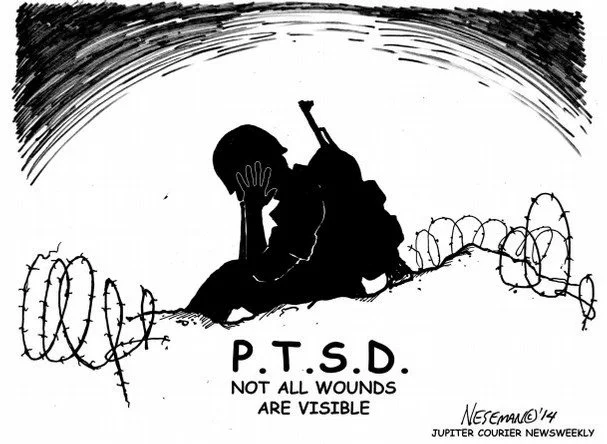When you thank a veteran - which you should do each and every day - remember that just because they are no longer on active duty does not mean they are no longer fighting a war.
With Veterans Day on the horizon, let us take a few minutes to think about what it means to give of yourself physically, mentally and emotionally - without consideration of the consequences - so that others can remain safe.
Being a veteran means forfeiting your dreams so that someone else can pursue their dreams. Being a veteran means sacrifice and suffering not only during active service but often for a lifetime. Being a veteran means gratitude for opportunities offered and pride in accomplishments made through nothing more than your own desire to be the best that you can be.
Being a veteran is not something you graduate from like school. There is never a “retirement” date when your obligations to a job are passed on to someone else. Being a veteran is a forever state of mind… one those of us who have never donned a uniform or felt the weight of the “load” on our backs can truly understand. Being a veteran means being deserving of all the best this country has to offer. Sadly, it often means being denied the very things that are deserved.
***
As if the deficiencies in health care are not enough, statics for veterans living on the streets are mind-boggling. The Department of Veterans Affairs estimates that more than 67,000 soldiers are homeless on any given night. Florida, California, Texas and New York have the highest populations of homeless veterans with California topping the list at slightly less than 12,000. As of 2023, Florida had the third largest veteran population (1,450,000) which includes approximately 2,279 who are homeless. The largest percentage of veterans (98,000) live in Hillsborough County. It is estimated that more than 72,000 veterans live in Palm Beach County. As dire as the homeless numbers sound, local programs are working toward a successful end to veteran homelessness. In 2020 Flagler County, Miami Dade County, Fort Myers/Lee County, Punta Gorda/Charlotte County, and Daytona Beach/Volusia County announced an end to veteran homelessness.
According to the National Coalition for Homeless Veterans, the majority of soldiers without a roof over their heads are single and suffer from mental illness and substance abuse. A staggering 50% served during the Vietnam War, which ended in 1975. Are we to assume that these wounded warriors have been tucking themselves into cardboard boxes for nearly 50 years?
A 2008 study by the Rand Corporation estimated that more than 620,000 veterans who had served in the Middle East would need long term care for traumatic brain injuries. According to that study one in five soldiers returning from war would display symptoms of PTSD, putting them at a higher risk for suicide. Now consider that in 2008 over 22,000 veterans called a suicide hot line begging for help. In 2023, the average number of veteran suicides is 17 per day.
By now you must have realized that the recurring theme in all these scenarios is mental illness. Obviously, post-traumatic stress disorder and traumatic brain injuries are not a recent side effect of battle. Veterans of yesteryear chose homelessness as a result of these conditions. Today’s veterans often choose to forfeit life.
The Continental Congress formed our official military in June of 1775 to fight the Revolutionary War. Deserters were rampant and the government used every means possible to track down these runaway soldiers and punish them. Since armies are useless without manpower, it is imperative that every soldier gives himself over completely to his superiors. Cowardice has never been an acceptable option in the service.
But what if the men who deserted were not all cowards? Is it too big a stretch to imagine that traumatic brain injury and post traumatic stress disorder have been with us since the dawn of time? Here we are nearly 250 years after the American Revolution and doctors are just beginning to accept the validity of such a diagnosis.
Soldiers are expected to be brave in the face of all danger, unwavering in their allegiance to their country; following orders blindly even knowing that death could be their reward. Should they not be able to perform to these standards, shame is their only companion.
War, to my mind, has to be the most frightening of experiences. I have never been a lover of horror movies. Real life is scary enough, and I am not about to pay someone to age me prematurely. However, when you go to the theater, you do so knowing that the threat will be over in ninety minutes. Imagine then the soldier who never gets to put his fears behind him.
For our military men and women, Freddie Kruger is very real; an evil menace who never sleeps. This enemy is not satisfied with just shooting our veterans. No… he wants to capture and torture them; cutting off their heads and displaying them on film for all to see. By comparison, Friday the 13th is a Disney movie.
My late father-in-law often related a story that took place while he was in basic training during World War II. In his battalion was a very nervous young man, who hated to be touched without warning. Should someone do so, he would flail his arms and legs, jumping like a marionette on a string. His condition worsened as training intensified.
One day, while lying prone on the ground during target practice, my father-in-law noticed the sergeant coming down the line and stopping behind each recruit. He would then place one hand on the soldier’s back and lower himself into the same position in order to see the target from the soldier’s perspective. The jumpy guy was next to Dad, and Dad feared that the sergeant’s touch would send live ammo flying all over the field and, in particular, directly at him.
As the sergeant approached, my father-in-law stood up. He was immediately order to resume his position. Dad was no fool and he was not afraid to challenge authority. With a nod of his head, he directed the sergeant’s gaze toward the soldier on the ground. The sergeant was no fool either. He realized that his own life could be in jeopardy. Keeping his hands in the air, he knelt beside the soldier, never making contact.
Is it not possible that Pre-traumatic Stress Disorder is a very real condition? Is it reasonable to expect the Army to watch out for potential victims before sending soldiers into battle? Have any of us reached maturity without suffering some type of trauma? War has to be the most exacerbating of experiences.
The workings of the human mind are fascinating and frightening. Think how uncomfortable you are when confronted by someone with a mental illness. Our first inclination is to run. Fear of the unknown, and nothing is more unknown than the human brain, sends shivers down our spines.
Imagine how the hierarchy of the military must feel. The Army et al. was founded on testosterone. A soldier is expected to carry on no matter what pain he must endure. The “bite the bullet” mentality works well in cases of physical injury but is not as effective when dealing with the deep recesses of the mind. As horrible as it is to lose a leg or an arm, that injury is treatable because it can be seen. There are bandages to stop the bleeding, bone grafts to repair breaks and prosthetics to replace limbs. What replaces brain matter?
No x-ray machine invented to date is able to pinpoint PTSD or TBI. No MRI can isolate an effected mind allowing doctors to cut that portion away leaving only healthy tissue. We fear what we cannot see and the military runs on the visual. While the vow of silence is showing signs of cracking and veterans are finally getting the treatment they deserve without fear or shame, fewer than 50% of those suffering with mental health issues seek treatment.
Napoleon Bonaparte said, “Death is nothing, but to live defeated and inglorious is to die daily.”
Let us not allow that sentiment to be the thanks we give to our veterans for their service to our country and for the gift of freedom which their service has allowed us to enjoy.


